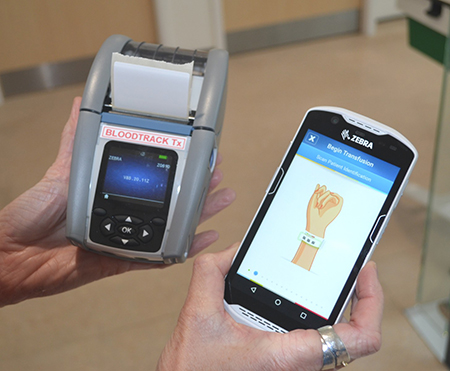Media Release
Date: 17 September 2019
New technology makes blood transfusions even safer
The latest technology is being used at the Royal United Hospitals Bath NHS Foundation Trust to further improve the safety of patients undergoing blood transfusions.
The RUH has invested in a new system called BloodTrack Tx, which uses wireless technology to securely verify a patient's identity when administering a blood transfusion.

Transfusion Specialist Helen Maria-Osborn said: "The new technology has been a great success and is making the blood transfusion process even safer for our patients.
"We already have systems in place to ensure that blood transfusions at the RUH are as safe as possible and this new technology is an important additional step."
A portable scanner reads a code on the patient's hospital wristband, which contains a range of information about the patient, including their blood type. This provides an additional level of safety for them, ensuring they get the right blood at the right time.
The handheld devices are connected to the RUH's laboratory systems and can also be used to generate barcoded labels for transfusion blood test bottles.
Helen said: "Today is World Patient Safety day, which aims to increase awareness of patient safety and encourage people to show their commitment to making healthcare safer. Patient safety is vital to our work here at the RUH and this new technology will help our patients get the best possible care."
Transfusion Nurse Trainer Lindsey Palmer said: "The technology is now being used across the hospital and has been very well received by staff, who have welcomed it as a secure and easy-to-use part of the transfusion process."
To mark World Patient Safety Day, an information stall was set up in the Atrium at the RUH so patients and staff could find out more about the patient safety projects taking place at the hospital.
A blood transfusion is when you're given blood from someone else (a donor). It's a very safe procedure that can be lifesaving. On average, the RUH gives around 125 units of blood every week through transfusions.
A blood transfusion may be needed if you have a shortage of red blood cells. This may be because your body's not making enough red blood cells or because you have lost blood.
For example, you may need a blood transfusion if you have:
- a condition that affects the way your red blood cells work - such as sickle cell disease or thalassaemia
- a type of cancer or cancer treatment that can affect blood cells - including leukaemia, chemotherapy or stem cell transplants
- severe bleeding - usually from surgery, childbirth or a serious accident
A blood transfusion can replace blood you have lost, or just replace the liquid or cells found in blood (such as red blood cells, plasma or cells called platelets).
ENDS
Notes to Editor
- The Royal United Hospitals Bath NHS Foundation Trust provides acute treatment and care for a catchment population of around 500,000 people in Bath, and the surrounding towns and villages in North East Somerset and Western Wiltshire. The hospital provides healthcare to the population served by four Clinical Commissioning Groups: Bath & North East Somerset CCG, Wiltshire CCG, Somerset CCG and South Gloucestershire CCG.
- The Trust has 759 beds and a comprehensive range of acute services including medicine and surgery, services for women and children, accident and emergency services, and diagnostic and clinical support services.
- In 2015 The Royal United Hospitals NHS Foundation Trust acquired the Royal National Hospital for Rheumatic Diseases (RNHRD) NHS Foundation Trust. The RNHRD treats patients from across the country offering services in rheumatology, chronic pain, chronic fatigue syndrome/ME, cancer related fatigue and fatigue linked to other long term conditions such as multiple sclerosis.
- The RUH is changing - we have an exciting programme of redevelopment underway transforming our site and further improving the services we provide. The Trust has opened the purpose-built RNHRD and Brownsword Therapies Centre and is now working towards the new Dyson Cancer Centre. For more details visit: www.ruh.nhs.uk/fit4future

